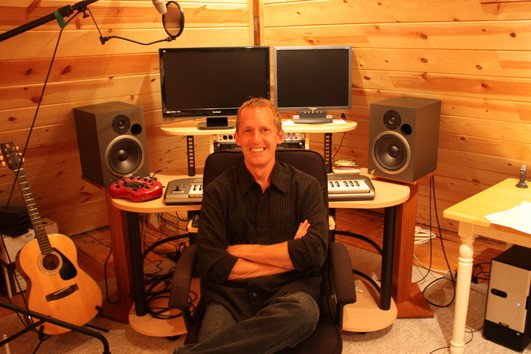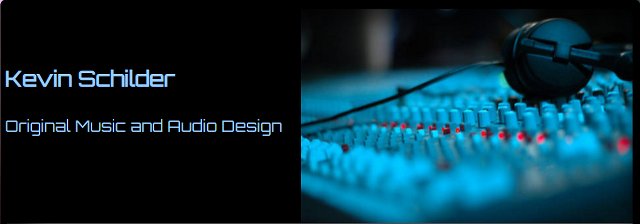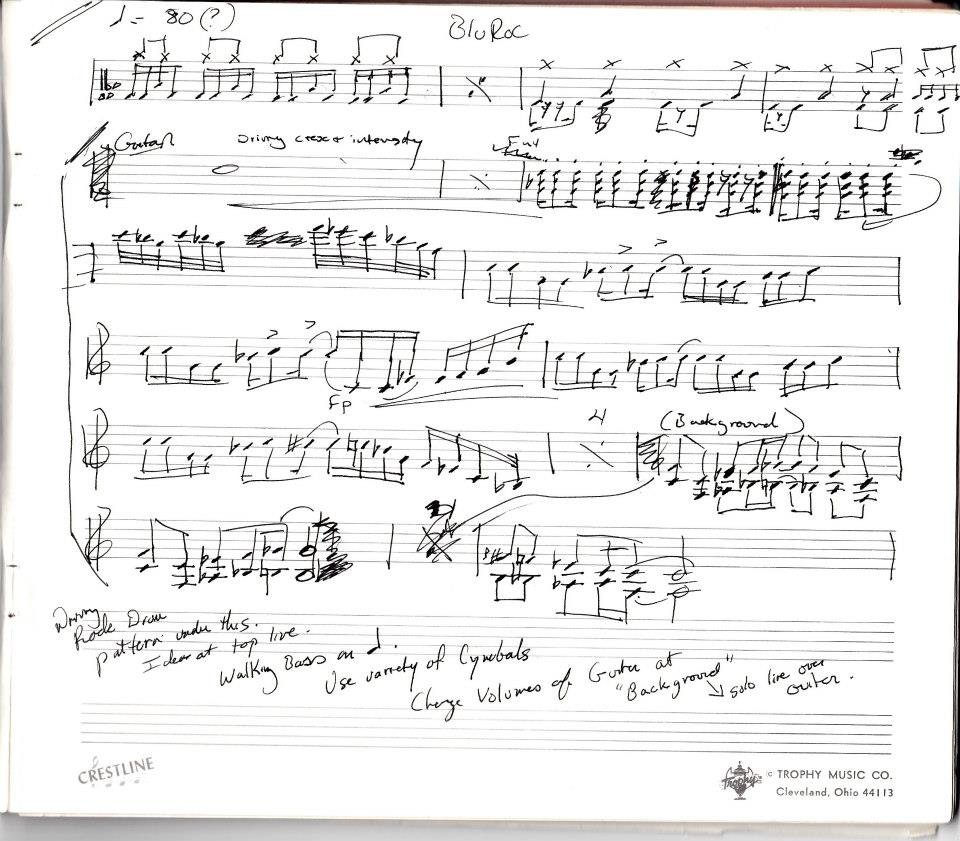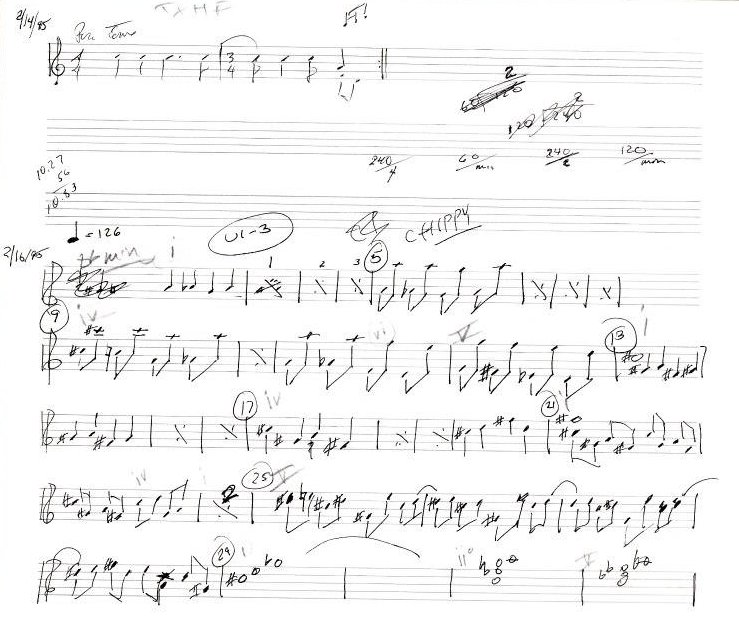❝That was the true realization of a dream.❞
Kevin Schilder's interview11/19/2020
 Kevin Schilder is a household name of the Heretic/Hexen games, as the composer of the series' music and sound effects. Love Heretic's instantly recognizable classic opening song or the way Ettins moan like puppies? Thrill each time that forever memorable low voice pops back into your mind saying "Greetings Mortal, are you ready to die?" He's behind all of them! And now he'll tell us a bit more about some small secrets and trivia behind his awesome work...
Kevin Schilder is a household name of the Heretic/Hexen games, as the composer of the series' music and sound effects. Love Heretic's instantly recognizable classic opening song or the way Ettins moan like puppies? Thrill each time that forever memorable low voice pops back into your mind saying "Greetings Mortal, are you ready to die?" He's behind all of them! And now he'll tell us a bit more about some small secrets and trivia behind his awesome work...
Nota bene: Kevin gave tons of valuable info in other places already, notably in Scott Tobin's Composers Play Youtube series (definitely a must-see). Some questions in this interview (marked with an asterisk *) refer to that former source, yet focusing on a different approach to avoid repetition.First would you please tell us a bit more about yourself?
Well, there is probably a lot I could say, but I’ll stick to things related to our subject. I have been a music person since I was about nine years old when I started taking saxophone lessons. I loved to play and was good at it. So, I was in all the bands in school. Later I was in a rock band, which is still the best paying job I ever had. I got a degree in performance and later music education. On top of that, I have always loved games of all kinds. I also got interested in computers when they started becoming more popular. That led to my career in music composition and sound design for video games. In addition to that, I love to read and write. I’ve been a runner for about 45 years. There is a lot more to know about me, but I prefer to reveal that stuff to my friends or people I’m getting to know in person. Right now, I’m doing occasional audio work and just started doing general transcription.
This could be a long story, but I’ll try to take you through it quickly and clearly. I met Brian Raffel in college. While there, we happened to talk about D&D and I mentioned I had played. We decided to try getting together to play and loved it. We got hooked and started playing most Friday nights. Steve and Brian were roommates, so Steve eventually jumped in to join us. We all loved the fantasy genre and the fact that we were essentially creating our own adventures and stories.
Although video games were still pretty limited in those days, there were certain games that had come out that mimicked the Dungeons and Dragons style of play. We got interested in those games as well since they were so much like the D&D we loved. As time went on, the games got better and more realistic. Eventually, Steve and Brian were playing a game called Dungeon Master. That game was about as close to a true D&D adventure in a video game as you could get. They somehow got the idea of trying to make a game like that of their own. There were a lot of steps after that to figure out how to do it. But eventually, Brian and Steve had started working on their own game which became Black Crypt. Once Black Crypt was published, Brian and Steve became full-time game makers.
The next step was when the FPS genre really got going and became very popular with games like Wolfenstein and then DOOM. I started working at Raven Software when they were working on Heretic. What I saw in that game was the true realization of the kind of fantasy world we had loved in D&D, but with the full motion and action we never thought could happen. We had a fully immersive experience of monsters, weapons, spells, puzzle and traps in a fantasy world we created. That was the true realization of a dream.
"Bluroc" was a piece of music in the game Heretic. So, this was back from 1994. In the game, it was given the much more exciting title of "mus_e2m3".
– Kevin Schilder ![]()
Heretic, Hexen and any iteration of those games hold a special place in my heart. I was fortunate to be part of a group that had the opportunity to create a brand-new world and story out of nothing. That is a rare privilege. The fact that both the games and the story became loved and grew, was just another level of amazing. I am personally very connected to those games because of how invested I was in helping to create them. The music and audio were my original creations and came from the impressions I had about the game world or how I wanted it to be experienced by others. When you put that much of yourself into something, it becomes close and personal. I was proud of both my work and the work of our entire team on all those games. Although each game was somewhat different and unique, they were all faithfully tied to the original concept. I enjoyed both working on and playing each of those games.
As it turns out, Hexen II was perhaps the only one of the games that I feel less connected to because I did not create all the audio. In 1997, I was creating all the sound and music for Take No Prisoners and Mageslayer. I was also the creative director for TNP. Hexen II was also happening at the same time. It was then that we decided I was going to need help and I hired the first additional sound designer for Raven, Chia Chin Lee. I continued to work on the music for Hexen II along with all my other work, but since I was so crazy busy with so many other things, he really became much more the main audio overseer of Hexen II and the guy to create the SFX for the game. It was hard for me to have to give that part up, but there was just no possible way for me do it on top of everything else. Chia was new to the job, but he had the previous games to refer to and I gave him as much freedom as possible to do what he liked. We worked well together to keep the game sounding consistent with the franchise and he was pretty faithful to the genre I had created, but Hexen II has his own style and talent.
The unsung hero of the series was Heretic II. We dared to make a 3 rd person fantasy at a time when that genre was struggling. The game was amazing and so well done. It has some of my favorite music and SFX work that I did. The staff combat was awesome and became a predecessor to the light saber combat created for Jedi Knight II: Jedi Outcast. That game should have been a huge hit and won awards. Unfortunately, it was just in the wrong place at the wrong time.
I’m so proud to be able to look back and say I was part of something truly original and memorable. The fact that people still love the games to this day just testifies to how great the games are. In a world where many games are just remakes of the same thing over and over, I got to be part of a time and effort to make something unique and memorable.
While creating music for fantasy games, you had to meet a form of audio credibility... for worlds that didn't exist! How did you take up this challenge and where did you take your inspiration from?
My inspiration for the music I did in games like Heretic and Hexen came from odd places. I would sometimes listen to random CDs of music from the ‘80s, movie soundtracks or just any music that was laying around. I was not looking for big things. I was looking for small things. Sometimes I would hear a short phrase or a few notes or some sort of catchy rhythm.
Those would become the groundwork. Other times I just plunked around on the piano until I heard something I liked. Basically, I composed in little pieces. I started with tiny ideas. Then I would listen for what was missing. I could just hear it in my imagination. I added new parts little by little. That is how I composed. I filled in the empty spaces with what I heard next.
The style I aimed for is hard to explain. It’s just what I felt. I knew it when I found it. I new the game should feel dark, dangerous, exciting and fantastic. What that means to each person is something different. The music of the games I worked on is how it felt to me.
In general, I had little or no instruction on what to do when it came to creating my music. I was pretty much left alone and given the freedom to do what I chose. I was the only musician and sound designer. I had no one to collaborate with or leading me. I got general ideas and reviews from the other people working on the project. But mostly, I came up with the format, style, instrumentation and composition for everything completely on my own.
I was the only audio person, so there was really no one to collaborate with when it came to my work. I attended department meetings where I got and gave ideas on what to do in terms of music and SFX. People were good at sharing general ideas, but no one else really did the type of work I did. So, I mainly was left to figure things out on my own. I did study other games like DOOM which helped guide my approach to both music and sound design. I made my own decisions about what to do and how to do it. Once my work was done, I worked with a programmer or designer to get things in the game. We played our games a lot back then. There was no QA department. We would play and then talk about the game. That was where I got some good feedback on what people did or did not like in the game. I trusted my fellow gamers and coworkers because they were very familiar with the game and had good ideas on how to make it look and sound better.
Id was producing the game and John Romero was the producer. They had a vested interest in our work because our success or failure would reflect on their reputation. Heretic and Hexen needed to match the same standard of quality and excellence as DOOM. So, John would review the game and guide the production. For me personally, he had certain general suggestions on what to do with the music and SFX. I don’t recall him getting into specifics much since that is not his area of expertise. But John had a really great intuitive sense of how to make a great game and could translate those ideas very well into meaningful suggestions.
This is the original score from when I was writing the piece I called "Chippy" for Hexen back in 1995. Yes, that's right. I used a real pencil and real score paper to write music for a computer game. Old school. 
– Kevin Schilder ![]()
If you think about it, Heretic was the first of its kind and a complete original. So there was no precedent to refer to. We were learning and discovering as we worked. Time was very short. I could not wait for a map to be built and then use it as inspiration for the music. We made those games in a year or year and half. Maps were primarily built for playability and layout. The actual look of the map was usually less defined. Designers made them up as they liked. We were always working at the same time. Designers could not afford to wait for me and I could not wait for them. We collaborated and made adjustment along the way, but otherwise worked on our own. That is one of the huge advantages we had in that we actually played our games a lot as we were building them. We wanted to see and hear and test our work to make sure it was fun. We did not farm that off to some QA department and let them decide. So we were always intimately connected to our work. I had to just go with my gut based on the information I had and make adjustments later. Once Heretic was done and had good reviews, we were able to use it as a guide for Hexen.
Hexen had a more complex design, so we talked in advance about the layout and mood and location for each map. I had some pretty good verbal and written descriptions to guide me, even if the maps weren’t built yet. Places like swamps, mountains, chapels, castles, etc. evoked ideas that helped me choose how to compose. As far as SFX were concerned, we didn’t really have a system for playing random ambient sounds in Heretic that I recall. In Hexen, we knew you would spend more time in each map and wanted it to feel alive. So, we created a list of random ambient sounds that would load with the map and play. We were still very limited by file size and loading speed to what kind of sounds and how many could be used. But even just a few made a difference and became a big step in bringing the game to life. I have less I can say about Hexen II since I did not work on that aspect of the game.
I always worked with a PC computer. My first one was my own and I had to bring it in to work. As time went on, I got new and better computers. I used Cubase to compose music and Sound Forge for sound effects. I’ve played around with other programs over the years, but those have been my workhorses. Once you have a good program, it’s nice to not keep learning new ones. The tools are just tools and get in the way of composition if you have to keep messing with them. I composed in midi only to begin with. I did all I could to learn about it and figure out ways to create performances that sounded like the real live music I was used to hearing. I did all I could to use the nuances of expression. I was very meticulous and did a lot of work by hand. I also used my training in orchestration to make sure I didn’t do things with the general midi instruments that were impossible for those normal instruments. I heard other people do this and it always sounded wrong. There are range limits to all acoustic instruments and if you go outside those ranges, they sound very wrong. Also, real musicians need to breath and run out of air and make little mistakes. I tried to keep that in mind and incorporate those factors into my music. I think that, if my music sounds good, it’s partially because I was always pushing the computer to play like a human being.
Ogg was just another form of compression like mp3. I will leave it to someone else to explain how it works. The important point for us was that you could turn huge WAV files into smaller ogg files. Midi files took virtually no space on a CD. When we went to Red Book audio, the music files took up most of the CD and we had to limit them. When mp3 and ogg came along, we had a way to compress the music into smaller files that still sounded fairly close to the nice quality of CD music. Mp3 was okay, but ogg seemed to sound better. So it was another improvement to be able to support that form of compression in our games.
First thing I must say is I did not make that. Second thing is that I’m having trouble remembering what the whole deal was with that piece. It’s basically just a random mix of SFX from Hexen II on top of a very simple beat and music. My guess is that Chia Chin Lee made it towards the end of the game as a joke or something and it got thrown into a mp map and into the game. Wish I could tell you more. You should try to reach Chia Chin and ask him.
I don’t really have a lot of fun trivia to share. Or maybe I do, but just can’t remember. For Heretic and Hexen, I did the voices of all the Disciples and such. I worked really hard at it to get something cool. Backwards speech was sort of a standard. But if you don’t do something with it, it just has a weird sucking sound that everyone knows and it sounds like you took the easy way out. So I worked to find cool or fun phrases that sounded good backward. But then I also worked to perform them so they would sound cool and real when reversed. I used inflections and accents that sounded ridiculous until they were reversed. With some additional processing, they became the final voices. I’m probably most proud of that work when it comes to my SFX.
The voice of the guy on the walls of Hexen hubs was done by a former designer at Raven named Tim Moore. I still have his original performance recordings. Back then, a lot of the people I worked with did character and monster voices. We didn’t have to worry about unions and using famous actors. It was more fun too.
A lot of my SFX were created from source material off of a CD library. But I did create some cool Foley SFX. The ice sounds for the ice spell in Hexen was made by me using trays of ice cubes from the freezer. Doing Foley work is a blast and a true performance art in itself. I always had fun coming up with ideas for SFX.

Kevin Schilder in his studio
As I mentioned in another question, my available time to compose music for Hexen II became very limited. I chose to revisit the music from Hexen because I just thought it made sense. Why would you not want to bring back some music from the original to tie the series together? All the big movies do it. When you see Star Wars movies, you want to hear the music themes you know. No one wanted a new theme for Darth Vader, right? I wanted to bring back memories of Hexen and that world.
I wasn’t trying to cheat or be lazy. But it did help me a lot to have to original pieces to start from and build off. What did become an inspiration was some of the thematic ideas like the Roman and Egyptian themes. I chose to add some very typical instruments to help define those themes such as an oboe for Egypt. I didn’t spend a lot of research or energy on that part. I followed my gut and my ear and did what sounded good to me.
I’ve always been like that. When I compose, I tend to try and be quiet and listen and create what I hear that needs to be done. It’s a huge amount of inspiration that comes from someplace I can’t define. The rest is all about the training, skills and experience in music and with the tools of the trade.
I’m drawing a bit of a blank on that credit. That title probably meant I was helping plan and coordinate some of the overall scheduling and production like a project manager. I’m sorry that I don’t recall more than that. It was the busiest time of my life and a lot was happening. If I dug into my notes somewhere, I may be able to find something to help me remember more about that credit.
When Raven became a studio for Activision, things changed. Activision didn’t seem to see a future for Heretic and Hexen. Those of us close to the game often tried to suggest a remake and many of us wanted to do that out of love for the franchise and the fans. But there was never any interest at the corporate level.
Heretic II was probably the reason there weren’t more. It didn’t make enough money. Big game companies make big games to make big money. Money drives everything. So, if marketing didn’t believe in something like Heretic and Hexen, they were done.
It has been hard for me to even track down who has had the rights to them over the years. They appear to be like the crate with the Ark of the Covenant from Indiana Jones. Just another amazing treasure that got shoved into a warehouse and forgotten. Thankfully, there is still a wonderful fan base out that there that keeps the memory alive.
Over the years I have heard from people all over the world who have loved the Heretic and Hexen games. Many of them are still playing the versions you mentioned and continuing to create their own new mods. That is what makes these games so timeless. They never stopped being fun just because they are old. Monopoly is an old game, but it’s still fun. Truly savvy gamers understand how fun never changes. I’m always incredibly surprised, humbled, and honored by each person who reminds me that something I worked so hard on and feel so good about is still alive and will hopefully continue to be so for years to come.
I have not. Never learned that skill. I think there was a time where we toyed around with the idea of having more people learn the tools to come up with maps. But I had no time for that. Great designers are geniuses in how they can build the right map. I give them all the credit for that skill.

Kevin Schilder's website
 Inky's Hexen II Mapping Corner...
Inky's Hexen II Mapping Corner...

